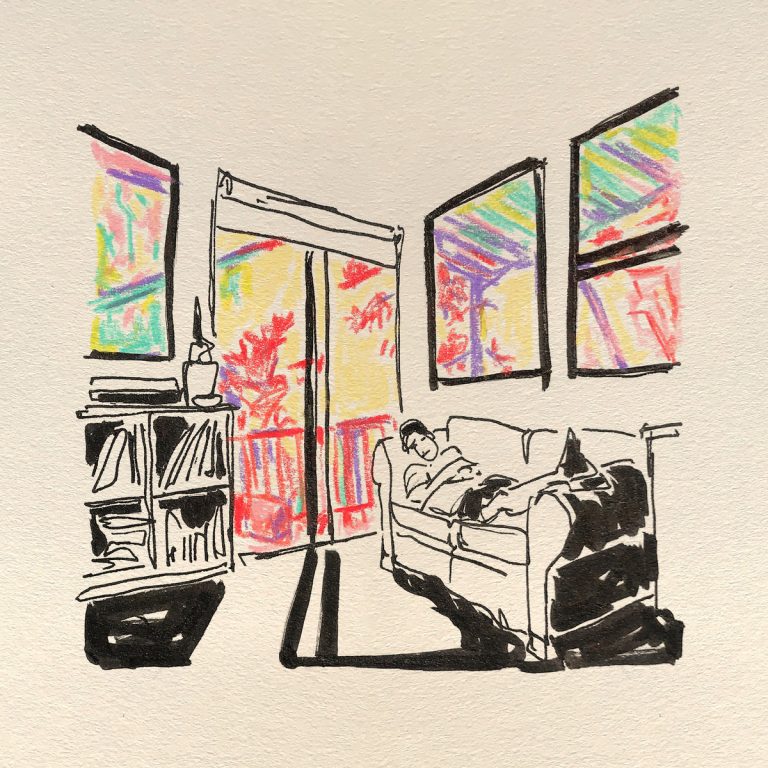Although Future Street was the first time Michael Stevenson brought in outside help with the production of his music, it’s a record that was undoubtedly written alone. As Stevenson went into lockdown in 2020, he used the time to tinker away and write music that would become Future Street, his first full album under his Blue Wilson moniker. Stevenson even had multiple tracks finalized and ready to go before he decided to bring in producer Ben Lumsdaine (“Something flipped in my mind,” Stevenson said upon first meeting Lumsdaine.) Exploring his fondness of psych-tinged Americana and warm 70s pop, Stevenson carried forward the endeavours of his group Small Forward (which he launched with college classmate Rounak Maiti back in 2016).
It’s a style fitting to Stevenson’s words here; his focus is longing, companionship, and isolation. And, though he sings with a genuine pang of yearning, his worries and desires seem everyday and relatable thanks to the often breezy backdrop of guitars and occasionally lush synths and strings. There’s echoes of Foxygen, Kurt Vile, and even a smidgen of Circulatory System in the occasionally more psychedelic-leaning moments (if not also in Stevenson’s higher register, which isn’t unlike Will Cullen Hart at times). Future Street‘s enjoyment comes from gentle nods to other familiar sounds and genres, the way the hooks nestle gently in your head like reassuring words of encouragement, but mostly in Stevenson’s quiet forlornness.
Never one to get too mopey, Stevenson’s tone elevates his lyrics that occasionally read a little too sentimental on paper, but are nonetheless delivered with an earnestness that’s hard not to get swept up in. “I don’t want you to dance alone / Crying in the car when you’re on your own / Even in the falling rain / I’ll be there,” he offers on “The Wringer” with a genuine desire to comfort in his voice. Elsewhere, on “Copilot”, he laments “If you look in my eyes / I’m a black hole in disguise / I am broken paradise” with such restful, downtrodden energy you can forgive the kind of elementary simile. This melancholy and romance-tinged kind of writing might not be up everyone’s alley, but the care in the writing is evident and there are quotable gems across the record.
When not lamenting over someone missing from his side, Stevenson also offers up takes on modern life and living. On the excellent centrepiece “American Cement” he sings “All they do is pour cement / across the whole damn continent / then they ask me for the rent” before adding gently (and with the tiniest, wryest smile), “And I tell them please fuck off.” It’s a quiet takedown of modern living and wanting to break free from feeling trapped in your apartment, and when the song charges to a swell in the final minute, the frustration has simmered to the surface without Stevenson ever raising his voice. Meanwhile, on “Everybody Goes In Their Own Way”, he’s at his most dour (“Just like the swimmer sinking / The dads at their drinking / Everybody goes in their own way”), but despite this there’s an air of optimism that lifts the song out of the depths; “I may be close to the end / but today’s not my day,” he affirms.
It’s this optimism colouring the edges of his lyrics that make Stevenson such a likeable singer to follow through his journeys here. “Life isn’t about living out your dreams / It’s finding love in little things,” he offers near the start of “Little Things” before ending the song with a rollicking final burst. Likewise on the wonderful and dreamy opening track “Underwater Dance” the soaring strings bring the “we’ll float up / soon my friend” line to life, leaving you coming out the other end convinced everything will be okay. Even on the cynical “American Cement” he sighs “But at least i’ve still got time”.
“Come Back Soon” is the thread that perhaps weaves together Future Street, appearing in two versions at either end of the album. On the reprise the arrangement is more languorous than the initial version, dipping its toes into that aforementioned psychedelic waters. The titular call is at first a memorable one, Stevenson sounding like he’s singing with a lump in his throat, while second time round it all feels like a strange dream he’s waking from. It’s like returning to the outside world after months alone inside, being face to face with people again after a long absence of company. “This record is my attempt to parse out the contradiction of enjoying that isolation while needing meaningful human connection,” Stevenson says of Future Street. It’s reclusiveness warmed by an outside hand and a new friendship. It’s okay to be sad and lonely, but with producer Ben Lumsdaine, Stevenson shows us that being so can also sound quite lovely.

